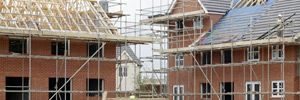 New research has revealed the full extent of the house-building industry’s contribution to the national economy, generating œ1.4bn in annual tax revenues for the Government.
New research has revealed the full extent of the house-building industry’s contribution to the national economy, generating œ1.4bn in annual tax revenues for the Government.
The report – released by the Home Builders Federation (HBF) and consultancy Nathaniel Lichfield & Partners (NLP) – claims that the industry is worth œ19.2bn per year to the UK economy and employs more than 600,000 workers.
The new publication also points out the ‘hidden’ social and economic contributions that the house-building sector makes, including the payment of œ576m towards community projects, such as educational and leisure facilities. This is in addition to the 32,000 affordable homes – worth œ2.3bn – built or financed by private house-building, with a further œ1bn paid to local authorities as a contribution to more affordable housing.
Despite these positive aspects of increased house-building, the number of new homes being built remains well below the 240,000 experts believe are needed annually to keep up with demand – provisional figures from the Department of Communities and Local Government suggest that 2014 saw around 119,000 new homes completed.
As the May General Election approaches, the house-building industry is urging all parties to prioritise policies that would allow more homes to be built, and in doing so, give the country a huge economic boost.
Stewart Baseley, executive chairman of the HBF, said: “House-building makes a huge, largely hidden social and economic contribution to the UK. Whilst housing output has increased, we are still not delivering anywhere near what is needed. As well as providing desperately needed new homes, increasing house-building would deliver massive additional benefits to communities across the land. People often don’t realise that the new community centre or school or football pitch has been paid for as a direct results of new homes. Providing new homes for people also means better facilities for the wider community. These are the very things that turn a collection of houses into communities; brand new places where people want to live.
“As we approach this important election, politicians must prioritise housing policies to help house-builders build the homes we need.”
According to the report, if another 100,000 homes a year were built it would also generate 430,000 extra jobs; a further œ11.9bn in economic output; more than 20,000 affordable homes; and many more community benefits.
Matthew Spry, senior director and head of economics at NLP, which conducted the research on behalf of the HBF, said: “In recent years the UK has failed to hit house-building targets, and last year alone we fell short by at least 100,000 homes. It is now widely accepted that we need to build more homes, and quickly.
“If we can rise to that challenge and build at least the 100,000 extra new homes that the UK needs each year, we stand to gain immensely. These benefits need to be recognised in national policy for housing and the economy, and to be properly reflected in the decisions that are made by local authorities and communities in deciding on proposals for housing development. People need homes to live in. But further, our report shows more housing will make us all more prosperous.”
To read the HBF and NLP report, click here




